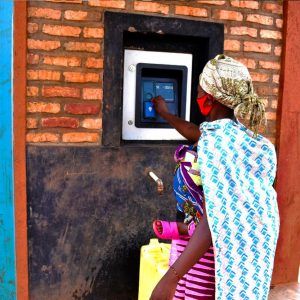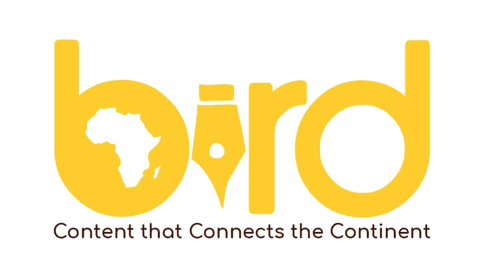Rwanda has begun providing digital access to newly-installed clean water dispensers in rural areas, part of a wider move that the country has initiated in order to roll out a cashless and paperless economy by 2024.
By Ange de la Victoire Dusabemungu.
"We no longer need our grandchildren or neighbours to come and bring water for us," said Bertrida Mukamuvara, an over-60 resident of Kabatwa Cell in Southern Province, Rwanda.
Some 5,000 households in the area are now able to access clean water, thanks in part to AQtap water dispenser technology, a digital solution for the provision of clean water.
This technology that allows people to access water in a friendly way is uncommon in Rwanda and other African countries where many are still struggling to access clean water and have to travel long distances to access it.
Using AQtap Technology requires that you have an AQtap Card loaded with money, tap it on the dedicated machine called AQtap water dispenser and add the amount of water you want and then the money is deducted from the Water Card based on the quantity of water fetched.
In Kigoma Sector, Huye District in Kabatwa Cell, the technology was introduced in collaboration with World Vision Rwanda.
Beneficiaries of the new water dispensing system have told bird that this technology is very useful, especially for the efficient use of money, not wasting water, getting water whenever one wants without travelling long distances and being cheaper than the previous price where the standard was Rwf 20 per 20 litres of water and now has slashed to Rwf 8 per 20 litres of water.
Butorano Wellars is Sekera Village Chief. Sekera is one of the villages of Kabatwa Cell where the technology has been introduced.
Mr. Butorano, the Village Chief explains how the system works: “Every citizen has his or her own card. He comes whenever he wants, he brings his card and puts it inside the machine, the machine turns ON and then he clicks here and the water comes and starts to get it. It depends on the quantity you want. Even if you want one litre. The money is deducted based on the quantity of water that you want. If he wants three litres, he clicks and puts in three litters and he takes them and if he wants more he clicks again and continues to fetch water.”
This Kiosk building and the installed technology are all worth more than Rwf2 million. It also uses the Solar Energy System which contributes to the decrease of the price per one litre which stands at Rwf 0.4.
Although parents of advanced age have difficulty using technology, they are happy that they also have the opportunity to try to use it not only for access to water but also for other services.
Bertrida Mukamuvara is benefiting from the water dispensing technology.
By starting to draw water it was difficult because she could not find a place to put the amount of water she wanted. Her neighbours showed him how to use it.
Mukamuvara asked, "I put it this way? (Her neighbours around her: Yes) ....then she continues to explain:
“The fact that we have this water tap here has solved a lot of problems for me and I am not the only one here who is older than others. As you can see we are doing it ourselves, we no longer need our grandchildren or neighbours to come and bring water for us. You can bring a 15 litre jar. After taking water you go back home to prepare food to eat. After all, you wash and many more…”
Residents said they used to travel 30 minutes distances to fetch water downstream and now the situation has changed.
Mukamuvara adds, “We thank Kagame Paul, (President of the Republic of Rwanda) who brought us the progress we didn’t have. Recently I have also gone to the sector Office and put my hands and the water tap and immediately I started washing my hands. I went to pour soap and the water stopped and when I came back I washed again. If I want to put money on a card, I come and ask local water credit vendors to charge it for me.”
In addition to these populations, the administration also finds it to be a time-honoured technology and a global vision where the time lost on certain activities will be reduced.
Dukundimana Cassien, Executive Secretary of Kigoma Sector, said:
“In order to make the best use of time and to cope with this COVID 19 pandemic where everyone has to spend less time achieving more but also using technology, we have therefore found that it is better to use this Kiosk which has a technology, where the citizen has a Water Card loaded with money. If for instance has Rwf 2,000 to buy water in a month he knows how to use the money for the month and this also helps him not to waste the little water he gets.”
According to Huye District Mayor, Ange Sebutetege, the 19.7 km water pipeline that the AQtap water dispenser machine is attached to is in the pilot phase, which helps the community to fetch water at all times because it does not require the water bill collector to be present.
Mr. Sebutege told this reporter that “The technology helps citizens to know the quantity of water they use and ensure that they are not wasting available water.”
“It is about the vision of the country in the use of technology that solves the problems facing the people, and there is a positive change. We thank the people for their contribution to the construction of this pipeline,” Sebutege said in a message sent to bird.
The tap and go service method is also found in Rwandan transport, particularly in the capital city Kigali where a passenger has a card that he taps on a machine known as Tap and Go to pay for transport without using Cash.
Rwanda is implementing a green policy on National Payment System Strategy by venturing into a cashless and paperless economy by 2024.
It is clear that this country wants to trigger a mind shift and promote sustainable strategies in the long term. The rollout of universal access to clean water is likely to be another step in the process.
bird story agency
You will also love: The Importance of Sustainable Development Can No Longer Be Denied or Ignored





